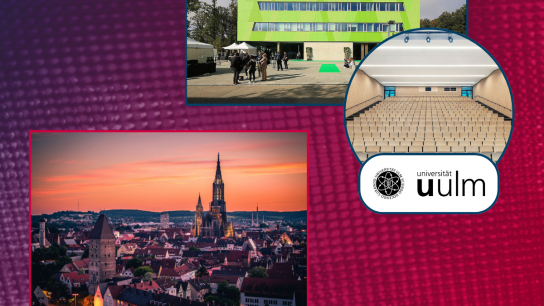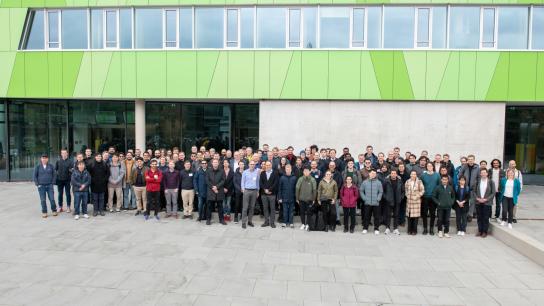Over 120 Participants Come Together at the University of Ulm for the 4th QSolid Collaborative Meeting
Ulm, 11 March 2024 – The QSolid collaborative project involving 25 partner institutions from research and industry is now in its third year of working on an error-improved quantum computer with superconducting qubits based on cutting-edge German technology. The project funded by the Federal Ministry of Education and Research (BMBF) is the largest of its kind in Germany. The aim is for Germany to play a leading international role in quantum technology in order to maintain independence and enable numerous new scientific and industrial applications.
Since the start of the project in 2022, the consortium led by project coordinator Prof. Frank Wilhelm-Mauch from Forschungszentrum Jülich (FZJ) has met every six months to discuss the current status of the collaboration, intermediate goals achieved, upcoming challenges and next milestones. From 11 to 13 March, Prof. Joachim Ankerhold from QSolid partner Ulm University is hosting the next collaborative meeting in the highly modern To Train U complex, which will meet the requirements of the large-scale project with over 120 registered participants and the many cross-thematic discussions.
Download Press Release
Last Consortium Meeting Before the Mid-Term Milestone
The five-year research project is about to reach the halfway milestone. This summer, after two and a half years of project work, a first demonstrator will go into operation and enable application tests and benchmarks. At this point, the project executing organisation VDI Technologiezentrum GmbH will evaluate the consortium's work to date with a view to achieving this essential interim goal and decide on funding for the second half of the project until 2026 inclusive. The consortium meeting in Ulm will be used on all three days of the event primarily to evaluate the contribution of all partners in the working groups for
- Quantum processor
- Input and readout around the processor
- Scaling technology
- Cryo technology
- Hardware integration and modelling
- Software stack
- Use case development
- Integration into an HPC environment
and discuss the final steps required and challenges to be solved at the halfway mark of the project, with each partner institution providing an update. Project coordinator Frank Wilhelm-Mauch believes his team is well on track towards the first demonstrator and is optimistic about the final preparations to be made. The topics show that an integrated and functioning quantum computer system requires not only quantum chips but also a whole range of classic high-tech made in Germany in order to function as a system.
Top-Class Advisory Board Contributes Expertise
QSolid is proud to be able to count on the support of a high-profile Advisory Board covering both research (physics) and industry (engineering). With
- Daniel Esteve (CEA)
- Rosario Fazio (International Center for Theoretical Physics)
- Hans Hilgenkamp (University of Twente)
- Marc Weber (Karlsruhe Institute of Technology)
- Michael Bolle (Carl-Zeiss-Stiftung)
almost the entire Advisory Board is attending the consortium meeting in Ulm in person, emphasising the importance of this project meeting so close to the mid-term evaluation. On the second day of the meeting, the five experts will provide comprehensive feedback on the work done so far and current problems to be solved in order to pave the way for a successful second half of the project.
Additional Staff for System Integration
The quantum computer developed in QSolid is to be made available to external users via the JUNIQ supercomputer infrastructure at Forschungszentrum Jülich and tailored to their needs. This requires the integration of all components developed by the project partners into the desired quantum ecosystem. QSolid applies methods based on the European space industry to develop a functioning, integrated system from the many components of the various partners and to mitigate technological risks. On the first day of the consortium meeting in Ulm, FZJ systems engineer Paolo Bianco will report on the current status of system integration and give the partners an outlook on the steps still to be taken together.
Expert Exchange and Socialising
In addition to the numerous partner updates and expert presentations, at the beginning of the meeting there will also be an overview of the latest news from the general project organisation, taking into account areas such as project planning, reporting and finance as well as public relations. Besides these obligatory agenda items, the consortium meeting will once again offer the more than 120 participants plenty of space for individual dialogue. On day two of the event, the second half of the day is reserved for the joint discussion of specific aspects from the various work areas. The partners can join these sessions according to their needs and interests or spontaneously open further discussion groups. Joint dinners and catered meeting breaks on all three days offer participants the chance for informal dialogue beyond technical discussions and are therefore a good opportunity for the large team of research institutions and companies to continue to grow together and overcome institutional boundaries.
“Our project is centred in North Rhine-Westphalia, but in some aspects we have key contributions from the quantum ecosystems in Baden-Württemberg and Bavaria,” says coordinator Prof. Wilhelm-Mauch. "We are therefore delighted to be guests in Ulm for three days."


